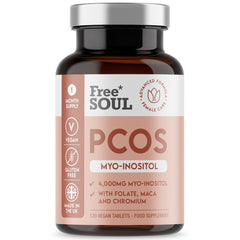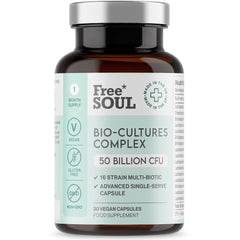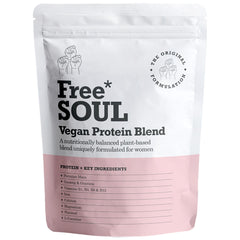PCOS and Bloating: Why It Happens and How to Manage It

Painful bloating is the reality for many women living with PCOS. Polycystic ovary syndrome, is characterised by an imbalance in hormones, including elevated levels of androgens (male hormones) and often insulin resistance. These hormonal changes can disrupt the normal functioning of the digestive system, leading to bloating.
Here at Free Soul, we want to shed light on important topics for women. We explore the connection between PCOS and bloating, why it happens, and offer practical strategies for managing symptoms. Whether you're someone living with PCOS, a friend or family member seeking to offer support, we’re here to guide you!
Why Does PCOS Cause Bloating?
Polycystic Ovary Syndrome (PCOS) is a hormonal disorder that affects 1 in every 10 women and can lead to bloating for several reasons, primarily related to hormonal imbalances and gut health. Here's a breakdown of why bloating is a common symptom of PCOS:
Hormonal Imbalances:
PCOS is characterised by an imbalance in hormones, including elevated levels of androgens (male hormones) and often insulin resistance. These hormonal changes can disrupt the normal functioning of the digestive system, leading to bloating.
For example, high levels of oestrogen, which can occur in PCOS, are known to cause water retention and can affect gut motility, leading to a feeling of fullness or bloating.
Insulin Resistance:
Many women with PCOS often have insulin resistance, where the body doesn't respond to insulin as effectively as it should.
This can lead to higher blood sugar levels and weight gain, particularly around the abdomen. The weight gain and changes in body composition can contribute to a bloated feeling.
Dietary Factors:
Women with PCOS are often advised to follow specific diets to manage their symptoms. However, figuring out the right diet can be a process of trial and error.
Foods that are high in certain carbohydrates, sugars, or dairy products can sometimes trigger bloating, especially if there are underlying sensitivities or intolerances.
Gut Microbiome Changes:
Emerging research suggests that PCOS may be associated with changes in the gut microbiome (the collection of bacteria and other microorganisms in the digestive tract). These changes can affect digestion and lead to symptoms like bloating and discomfort.
5 Ways to Combat Bloating with PCOS
1. Fine-Tune Your Diet
Tackling bloating often starts with what you eat. Pay attention to how different foods affect your body. Dairy and gluten are usual suspects for causing bloating in many people, but everyone's different. Focus on fibre-rich foods like fruits, vegetables, and whole grains. They're not just good for your overall health, they help keep your digestive system running smoothly. And don't forget to drink plenty of water – it's essential for digestion and can help reduce bloating.
2. Incorporate Probiotics and Prebiotics
Your gut health plays a significant role in how you feel, and that includes bloating. Probiotics (found in foods like yoghurt, kefir, and fermented veggies) add beneficial bacteria to your gut.
Prebiotics (found in foods like garlic, onions, and bananas) feed the good bacteria already living there. Together, they can help balance your gut microbiome, which can be especially beneficial if you have PCOS.
3. Keep Your Stress Levels in Check
Managing stress is vital when dealing with PCOS. High stress levels can trigger symptoms like bloating. Find stress-reduction techniques that work for you, whether it's meditation, deep breathing exercises, or engaging in a hobby that relaxes you.
Remember, your mental health is just as important as your physical health, especially when navigating the complexities of PCOS.
4. Review Your Medication
Some medications prescribed for PCOS, like Metformin, can cause gastrointestinal side effects, including bloating. If you suspect your medication might be contributing to your bloating, discuss it with your healthcare provider. They can review your current medications and may suggest alternatives or adjustments.
5. Consult with Your Healthcare Provider
If you're still facing challenges with bloating despite making dietary changes, it's a good idea to consult with your doctor.
Can Supplements Help With PCOS Bloating?
Certain supplements can help manage PCOS bloating, although it's important to remember that supplements should complement, not replace, a healthy diet and lifestyle adjustments. Here are some supplements that can be beneficial:
- Myo-Inositol: Found in our PCOS Supplements, Myo-Inositol is often used in the management of PCOS, inositol can help improve insulin resistance, a common issue in PCOS. By improving insulin sensitivity, it can indirectly help reduce abdominal bloating.
- Probiotics: These supplements can help balance the gut microbiome, which is crucial for good digestive health. Our Probiotics Capsules contain 16 strains of gut-friendly bacteria to support your gut health.
-
Magnesium: This mineral can be particularly helpful for women with PCOS. It aids in digestion and can help alleviate bloating. Try our Female Multivitamins for your daily dose of Magnesium!
- Maca: Maca is a fantastic herb with a rich history of use in traditional medicine. Many women with PCOS find that maca helps in managing symptoms, including bloating. Our Free Soul Greens powder contains Maca and tons of other nutritional goodies.
They can help rule out other causes and may offer additional insights or treatment options, such as adjusting your PCOS medication if it's contributing to the bloating. Having professional guidance is key to managing PCOS effectively.
Key Takeaways
PCOS can be a complex condition to navigate, but understanding it is the first step in managing it effectively. Remember, if you're dealing with PCOS, you're not alone!
There's a whole community out there going through similar experiences, and there's plenty of support and information available to help you manage it.
**At Free Soul, your well-being is our priority, and although we pride ourselves on our expertise in women's health and wellbeing, it is important to acknowledge the individuality of each person. Features published by Free Soul are not intended to treat, diagnose, cure or prevent any disease, or replace the advice of your GP. We always recommend consulting with a healthcare provider if you encounter any health concerns, and we’ll always be here to support you so you’re never alone on your journey.
Sources Used:
https://pubmed.ncbi.nlm.nih.gov/28821294/ - Understanding polycystic ovary syndrome from the patient perspective: a concept elicitation patient interview study
https://pubmed.ncbi.nlm.nih.gov/33658043/ - Characterisation of polycystic ovary syndrome among Flo app users around the world
https://pubmed.ncbi.nlm.nih.gov/32552864/ - Role of gut microbiota in the development of insulin resistance and the mechanism underlying polycystic ovary syndrome: a review










